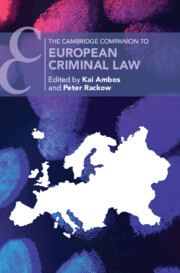Book contents
- The Cambridge Companion to European Criminal Law
- Cambridge Companions to Law
- The Cambridge Companion to European Criminal Law
- Copyright page
- Contents
- Notes on Contributors
- Preface
- Table of Cases
- Abbreviations
- Part I Foundations of European Criminal Law
- Part II Purposes and Principles
- Part III European Substantive Criminal Law
- Part IV European Criminal Procedure
- Part V Institutions
- 14 Office de Lutte anti-fraude (OLAF)
- 15 Europol
- 16 Eurojust
- 17 A European Public Prosecutor Office to Protect Common Financial Interests
- Part VI Perspectives
- Bibliography
- Index
- References
17 - A European Public Prosecutor Office to Protect Common Financial Interests
A Milestone for the EU Integration Process
from Part V - Institutions
Published online by Cambridge University Press: 09 February 2023
- The Cambridge Companion to European Criminal Law
- Cambridge Companions to Law
- The Cambridge Companion to European Criminal Law
- Copyright page
- Contents
- Notes on Contributors
- Preface
- Table of Cases
- Abbreviations
- Part I Foundations of European Criminal Law
- Part II Purposes and Principles
- Part III European Substantive Criminal Law
- Part IV European Criminal Procedure
- Part V Institutions
- 14 Office de Lutte anti-fraude (OLAF)
- 15 Europol
- 16 Eurojust
- 17 A European Public Prosecutor Office to Protect Common Financial Interests
- Part VI Perspectives
- Bibliography
- Index
- References
Summary
A milestone of the European integration process, the European Public Prosecutor Office (EPPO) has been established in 2017 through the enhanced cooperation mechanism and has become operative in 2021. Following a biphasic idea of criminal proceedings, the investigative and prosecutorial powers related to crimes affecting the European financial interests. are exercised by EPPO at the EU level, while adjudicatory powers are exerted by national courts at the domestic level – this justifies the EPPO’s multi-layered system which is, moreover, characterized by a verticalization of judicial cooperation in criminal matters. While the material scope of the EPPO is narrowed both to the so-called ‘PIF’ offences and broader ‘ancillary offences’, only an interplay between European and domestic levels may ensure the effectiveness of the whole procedure. Yet, the applicable national law in case, cross-border investigation issues, evidence rules and defence rights are very sensitive issues that still rest unresolved as the EPPO Regulation did not deal clearly with those matters. Despite the numerous issues, the establishment of the EPPO might pave the way to a deeper cooperation in criminal matters among the EU and Member States, through a pragmatic approach which would show its results in the coming years.
Keywords
- Type
- Chapter
- Information
- The Cambridge Companion to European Criminal Law , pp. 413 - 438Publisher: Cambridge University PressPrint publication year: 2023

